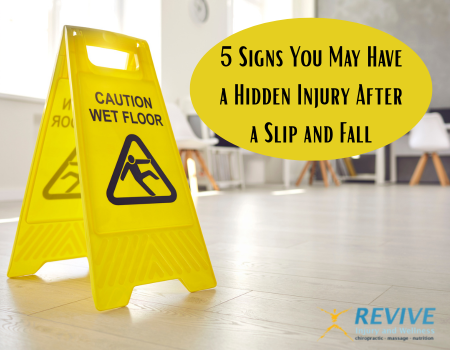
Slip and fall accidents are among the most common causes of injury, and while some injuries are immediately obvious, others may not show symptoms right away. In some cases, the impact of a fall can cause a hidden injury that might not be noticeable until hours or even days later. Understanding the signs of a hidden injury can help you seek the proper treatment before a seemingly minor issue becomes a bigger problem.
If you’ve recently experienced a slip and fall, it’s important to be aware of potential injuries that may not manifest immediately. Here are five signs you may have a hidden injury after a slip and fall.
1. Persistent Headaches or Dizziness
Head injuries, such as concussions or internal brain injuries, may not show immediate symptoms. After a slip and fall, it’s important to pay attention to any new or worsening headaches, dizziness, or feelings of disorientation. These could be signs of a concussion, which might not be obvious right after the fall but can cause serious long-term effects if left untreated.
If you experience any of the following along with a headache or dizziness, seek medical attention immediately:
- Nausea or vomiting
- Blurred vision
- Sensitivity to light or sound
- Difficulty concentrating or confusion
Even if the symptoms seem mild, it’s essential to get checked by a healthcare provider. A concussion can sometimes be more severe than it initially appears, and prompt care is vital for a full recovery.
2. Unexplained Back or Neck Pain
Back and neck injuries are common in slip and fall accidents, especially if you land on your back or twist your body awkwardly. While mild soreness might be expected after a fall, it’s crucial to monitor for signs of more serious issues, such as sprains, strains, or even spinal injuries.
If you experience any of the following, it could indicate a more significant back or neck injury:
- Persistent or sharp pain that doesn’t subside with rest.
- Pain that travels down your arms or legs
- Difficulty moving or turning your neck
- Numbness or tingling in your extremities
Back and neck injuries can have lasting effects on your mobility and quality of life, so if these symptoms persist, it’s important to consult a healthcare professional for an assessment.
3. Bruising or Swelling That Increases Over Time
While bruising and swelling are common after a fall, they should not worsen or become significantly painful as time goes on. If the bruising or swelling increases, it could be an indication of deeper tissue damage, such as a torn ligament or fractured bone that was not initially detected.
Watch for:
- Bruising that becomes more pronounced or spreads
- Swelling that persists or worsens over time
- Intense pain that doesn’t improve with ice or over-the-counter pain medication
These could be signs that you need an X-ray or further diagnostic tests to rule out fractures or internal injuries. Even if the swelling appears mild at first, don’t ignore it—seeking medical advice can prevent complications down the road.
4. Joint Pain or Limited Mobility
After a fall, you might feel stiff or sore in certain areas, especially in your knees, hips, or ankles. However, if you notice ongoing joint pain, difficulty moving, or a significant reduction in your range of motion, it could indicate damage to the joints, tendons, or ligaments. These injuries can take time to fully manifest, so it’s essential to monitor your mobility closely.
If you experience:
- Swelling, bruising, or warmth around the joint
- Difficulty walking, bending, or moving the affected area
- Pain that increases with activity or movement
It’s advisable to consult a healthcare professional. In some cases, joint injuries might require physical therapy or even surgical intervention if they are severe enough.
5. Nausea or Trouble Sleeping
Hidden injuries from a slip and fall may not just manifest physically; they can also affect your mental and emotional health. Nausea, difficulty sleeping, or changes in appetite can be indirect signs of an injury, particularly head trauma or spinal issues. Even if you don’t have any visible symptoms, these changes in behavior could indicate an underlying condition that requires attention.
If you experience:
- Persistent nausea or vomiting
- Trouble falling or staying asleep
- Sudden changes in your mood or energy levels.
It’s essential to seek medical attention to rule out internal injuries or other complications. In some cases, these symptoms may be related to concussions or whiplash, which require treatment for a full recovery.
After a slip and fall, it’s easy to dismiss some injuries as minor, but hidden injuries can have serious consequences if left untreated. By paying close attention to any unusual symptoms—especially those that appear after the initial shock wears off—you can ensure that you receive the necessary treatment and prevent long-term health issues.
If you notice any of the signs mentioned above, don’t wait for the pain or symptoms to worsen. Seek professional medical care to properly diagnose and address the injury, and give yourself the best chance for a full recovery. Your health and well-being should always be a priority, even after what might seem like a minor fall.


